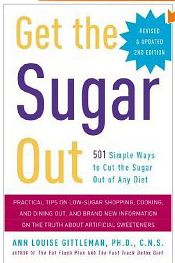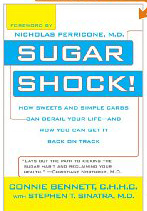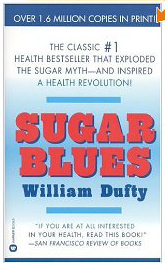Sugar and Your Health
Did you know that the average person consumes over 125 lbs of sugar per year?
Or that sugar is in most of the foods we eat on a daily basis, like breads,
pasta, potatoes, cereal, mayo, peanut butter, ketchup, and most processed foods? It's no wonder diabetes, heart
disease, and cancer are at an all time high ...
sugar feeds the disease! Excess sugar in one's diet acidifies the
body and opens the gates to serious diseases.This creates the need for
more calcium consumption to counter act this dilemma (alkalize the body).
It is almost impossible even for the health conscious in today's world
to eat correctly. Sugar has been linked to hundreds of diseases and conditions.
Do some research and find out for yourself how harmful sugar really is.
A multitude of common physical and mental ailments are strongly linked
to the consuming of 'pure', refined sugar. Sugar taken every day produces
a continuously over acid condition, and more and more minerals are required
from deep in the body in the attempt to rectify the imbalance. Finally,
in order to protect the blood, so much calcium is taken from the bones
and teeth that decay and general weakening begin.
Excess sugar eventually affects every organ in the body. Initially,
it is stored in the liver in the form of glucose (glycogen). Since the
liver's capacity is limited, a daily intake of refined sugar (above the
required amount of natural sugar) soon makes the liver expand like a balloon.
When the liver is filled to its maximum capacity, the excess glycogen is
returned to the blood in the form of fatty acids. These are taken to every
part of the body and stored in the most inactive areas: the belly, the
buttocks, the breasts and the thighs.
The following are just a few of the many detrimental effects that sugar
has on our bodies:
- Sugar can suppress the immune system
- Sugar can upset the body's mineral balance
- Sugar can contribute to hyperactivity, anxiety and depression
- Sugar can cause premature aging
- Sugar can negatively affect cholesterol levels
- Sugar can cause gastrointestinal problems
- Sugar can damage organs
- Sugar can weaken eyesight
- Sugar can contribute to weight gain and obesity
 Hugo Rodier M.D. - "We can say that consumption of refined sugars,
which is rampant and addictive in our society, constitutes a source of
toxicity to the cell membranes.With these types of foods, cell membranes
also become inflamed, since they lack the micronutrients to quell the fire produced
by our metabolic furnaces. These processed foods lack antioxidants to neutralize
all the oxidating free radicals produced by our metabolic furnaces, and
by toxins in the environment. Thus, our cell membranes also become oxidized.
Since the mitochondria (our cell furnaces) also depend on healthy cell
membranes (composed of the right sugars, fats, and proteins) to produce
energy, or metabolize, poor nutrition will cause mitochondrial dysfunction:
These are the most basic mechanisms known in modern medicine (J. American
Medical Association 2004;291:358.)"
Hugo Rodier M.D. - "We can say that consumption of refined sugars,
which is rampant and addictive in our society, constitutes a source of
toxicity to the cell membranes.With these types of foods, cell membranes
also become inflamed, since they lack the micronutrients to quell the fire produced
by our metabolic furnaces. These processed foods lack antioxidants to neutralize
all the oxidating free radicals produced by our metabolic furnaces, and
by toxins in the environment. Thus, our cell membranes also become oxidized.
Since the mitochondria (our cell furnaces) also depend on healthy cell
membranes (composed of the right sugars, fats, and proteins) to produce
energy, or metabolize, poor nutrition will cause mitochondrial dysfunction:
These are the most basic mechanisms known in modern medicine (J. American
Medical Association 2004;291:358.)"

Sweet and Deadly
Sugar addiction is a complex process that starts with the stimulation
of the sweet sensors in our mouth and ends with a
twisted whole
body immune response and a severely malfunctioning endocrine system.
Sugars are known to cause massive dislocations in our endocrine system
 leading
directly to a national obesity epidemic and the eventual and certain loss
of the body's ability to metabolize any sugar. The result of an out of
control sugar addiction is often diabetes, obesity, kidney failure, blindness,
amputation of the extremities and an early and miserable death. The price
of being allowing ourselves to be deceived by fraudulent labels and of
failing to cope with a sugar addiction is very high.
leading
directly to a national obesity epidemic and the eventual and certain loss
of the body's ability to metabolize any sugar. The result of an out of
control sugar addiction is often diabetes, obesity, kidney failure, blindness,
amputation of the extremities and an early and miserable death. The price
of being allowing ourselves to be deceived by fraudulent labels and of
failing to cope with a sugar addiction is very high.
When the per capita consumption of sugar was on the order of twelve
pounds per year, it posed little danger because most people can handle
that amount without adverse effects. Today's per capita consumption is
approaching 150 pounds per year, with certain subgroups, teenagers for
example, consuming much more; and, the negative health consequences are devastating.
The damaging effects of sugar are worsened dramatically by two other
dietary changes that were introduced in the early 1970's. These changes
act in synergy with sugar consumption to enhance the damaging effect of
sugar and to guarantee epidemic diabetes, overweight and obesity. One change
was the substitution of cheap junk oils for the highly beneficial coconut oil
we once had in the American diet. The awful health consequences
of this substitution have been widely exposed by
many students of these issues. Another factor was the widespread addition
of MSG to the food supply for the purpose of creating food addictions.
MSG is so well understood to reliably cause obesity, that a strain of lab
rats noted for their obesity and widely used by scientists in their obesity
studies, is identified as MSG rats. It was when these dietary changes were
introduced that obesity began to assume epidemic proportions in the US.
Excessive sugar has a strong mal-effect on the functioning of the brain.
The key to orderly brain function is glutamic acid, a vital compound found
in many vegetables. The B vitamins play a major role in dividing glutamic
acid into antagonistic-complementary compounds which produce a "proceed"
or "control" response in the brain. B vitamins are also manufactured by
symbiotic bacteria which live in our intestines. When refined sugar is
taken daily, these bacteria wither and die, and our stock of B vitamins
gets very low. Too much sugar makes one sleepy; our ability to calculate
and remember is lost.
Shocking Sugar Content of Common Food Products
Dr. Mercola
 It's hard to imagine, but a vast array of modern processed foods contain
more sugar than a glazed doughnut! Sugar in some form is present in nearly
every packaged product, from spaghetti sauce, salad dressing, and peanut
butter, to mayonnaise and ketchup, just to name a few. This outrageously
excessive sugar consumption has caused people's appetite regulation system
to go awry. Leptin, the hormone responsible for satiety, isn't working
properly anymore in a majority of people. It has now become clear that
limiting sugar, and fructose in particular in your diet is a key to
longevity for a number of reasons.
It's hard to imagine, but a vast array of modern processed foods contain
more sugar than a glazed doughnut! Sugar in some form is present in nearly
every packaged product, from spaghetti sauce, salad dressing, and peanut
butter, to mayonnaise and ketchup, just to name a few. This outrageously
excessive sugar consumption has caused people's appetite regulation system
to go awry. Leptin, the hormone responsible for satiety, isn't working
properly anymore in a majority of people. It has now become clear that
limiting sugar, and fructose in particular in your diet is a key to
longevity for a number of reasons.
For example, according to Dr. Richard Johnson, author of The Sugar Fix,
about 25 percent of all Americans consume over a pound of added
sugars a day, and this statistic dovetails nicely with the statistics showing
that one in four Americans is either pre-diabetic or has type
2 diabetes. Diabetics have, on average, a reduced lifespan of about
15 years. Your blood glucose levels rise slightly every time you eat. This
is natural. However, excessive sugar consumption will typically cause your
blood glucose levels to become excessively elevated and then stay that
way. It is a well proven fact that sugar increases your insulin and leptin
levels and decreases receptor sensitivity for both of these vital hormones.
The Links Between Sugar and Mental Health
Studies have found significant links between high-sugar diets and mental
health problems such as depression and schizophrenia, even though they
were not focused on the presence of inflammation per se. For example, a
2004 study published in the British Journal of Psychiatry found that a
higher dietary intake of refined sugar and dairy products predicted a worse
2-year outcome of schizophrenia. In addition, a low dietary intake of fish
and seafood (sources of healthy omega-3 fats) predicated high prevalence
of depression. The authors also pointed out the link between depression
and physical illnesses such as heart disease and diabetes, stating that
they all share epidemiological features. Noted British psychiatric researcher
Malcolm Peet conducted a provocative cross-cultural analysis of the relationship
between diet and mental illness. His primary finding was a strong link
between high sugar consumption and the risk of both depression and schizophrenia.
There are at least two potential mechanisms through which refined sugar
intake could exert a toxic effect on mental health. First, sugar actually
suppresses activity of a key growth hormone in the brain called BDNF. BDNF
levels are critically low in both depression and schizophrenia. Second,
sugar consumption triggers a cascade of chemical reactions in your body
that promote chronic inflammation. In the long term, inflammation disrupts
the normal functioning of your immune system, and wreaks havoc on your
brain. Once again, it's linked to a greater risk of depression and schizophrenia.
Sugar Blues
 Sugar Blues offers chilling facts about the health disaster
and social dangers created by wide-spread use of sugar, white flour and
other refined carbohydrates. This classic, bestselling expose on the dangers
of sugar reveals how this commonly ingested ingredient in countless foods
is highly addictive and causes a host of medical problems from depression
to coronary thrombosis. Pick up this book and begin to understand how eliminating
ONE FOOD ITEM ALONE can change your life. The classic, bestselling expose
on the dangers of sugar reveals how this commonly ingested ingredient in
countless foods is highly addictive and causes a host of medical problems
from depression to coronary thrombosis.
Sugar Blues offers chilling facts about the health disaster
and social dangers created by wide-spread use of sugar, white flour and
other refined carbohydrates. This classic, bestselling expose on the dangers
of sugar reveals how this commonly ingested ingredient in countless foods
is highly addictive and causes a host of medical problems from depression
to coronary thrombosis. Pick up this book and begin to understand how eliminating
ONE FOOD ITEM ALONE can change your life. The classic, bestselling expose
on the dangers of sugar reveals how this commonly ingested ingredient in
countless foods is highly addictive and causes a host of medical problems
from depression to coronary thrombosis.
In the Dark Ages, troubled souls were rarely locked up for going off their
rocker. Such confinement began in the Age of Enlightenment, after sugar
made the transition from apothecary's prescription to candy maker's confection.
"The great confinement of the insane", as one historian calls it,10 began
in the late 17th century, after sugar consumption in Britain had zoomed
in 200 years from a pinch or two in a barrel of beer, here and there, to
more than two million pounds per year. By that time, physicians in London
had begun to observe and record terminal physical signs and symptoms of
the "sugar blues".
Meanwhile, when sugar eaters did not manifest obvious terminal physical
symptoms and the physicians were professionally bewildered, patients were
no longer pronounced bewitched, but mad, insane, emotionally disturbed.
Laziness, fatigue, debauchery, parental displeasure-any one problem was
sufficient cause for people under twenty-five to be locked up in the first
Parisian mental hospitals. All it took to be incarcerated was a complaint
from parents, relatives or the omnipotent parish priest. Wet nurses with
their babies, pregnant youngsters, retarded or defective children, senior
citizens, paralytics, epileptics, prostitutes or raving lunatics-anyone
wanted off the streets and out of sight was put away. The mental hospital
succeeded witch-hunting and heresy-hounding as a more enlightened and humane
method of social control. The physician and priest handled the dirty work
of street sweeping in return for royal favors.
 Initially,
when the General Hospital was established in Paris by royal decree, one
per cent of the city's population was locked up. From that time until the
20 century, as the consumption of sugar went up and up-especially in the
cities-so did the number of people who were put away in the General Hospital.
Three hundred years later, the "emotionally disturbed" can be turned into
walking automatons, their brains controlled with psychoactive drugs.
Initially,
when the General Hospital was established in Paris by royal decree, one
per cent of the city's population was locked up. From that time until the
20 century, as the consumption of sugar went up and up-especially in the
cities-so did the number of people who were put away in the General Hospital.
Three hundred years later, the "emotionally disturbed" can be turned into
walking automatons, their brains controlled with psychoactive drugs.
Today, pioneers of orthomolecular psychiatry, such as Dr Abram Hoffer,
Dr Allan Cott, Dr A. Cherkin as well as Dr Linus Pauling, have confirmed
that mental illness is a myth and that emotional disturbance can be merely
the first symptom of the obvious inability of the human system to handle
the stress of sugar dependency.
In Orthomolecular Psychiatry, Dr Pauling writes: "The functioning of
the brain and nervous tissue is more sensitively dependent on the rate
of chemical reactions than the functioning of other organs and tissues.
I believe that mental disease is for the most part caused by abnormal reaction
rates, as determined by genetic constitution and diet, and by abnormal
molecular concentrations of essential substances... Selection of food (and
drugs) in a world that is undergoing rapid scientific and technological
change may often be far from the best."

Sugars That Heal: The New Healing Science of Glyconutritionals
"Sugars that heal" it sounds like a contradiction in terms, but it's
the key to one of the most important breakthroughs in recent medical science.
We've all been bombarded with warnings about the evils of consuming too
much sugar. But, in fact, for our bodies to function properly, we need
small amounts of eight essential sugars, only two of which--glucose and
galactose--are commonly found in our limited, over processed diets. When
all eight sugars are available, the health benefits can be breathtaking:
Individuals regain their ability to fight disease, reactivate their immune
systems, and are able to ward off infection. Based on cutting-edge research in the
rapidly evolving science of glyconutrients,
Sugars That Heal is an exciting new approach to health and disease prevention.
 As
medical doctor and scientific researcher Emil Mondoa explains, these eight
essential sugars, known as saccharides, are the basis of multicellular
intelligence--the ability of cells to communicate, cohere, and work together
to keep us healthy and balanced. Even tiny amounts of these sugars--or
lack of them--have profound effects. In test after test conducted at leading
institutes around the world, saccharides have been shown to lower cholesterol,
increase lean muscle mass, decrease body fat, accelerate wound healing,
ease allergy symptoms, and allay autoimmune diseases such as arthritis,
psoriasis, and diabetes. Bacterial infections, including the recurrent
ear infections that plague toddlers, often respond remarkably to saccharides,
as do many viruses--from the common cold to the flu, from herpes to HIV positive.
The debilitating symptoms of chronic fatigue syndrome, fibromyalgia, and
Gulf War syndrome frequently abate after adding saccharides. And, for cancer
patients, saccharides mitigate the toxic effects of radiation and chemotherapy--while
augmenting their cancer-killing effects, resulting in prolonged survival
and improved quality of life.
As
medical doctor and scientific researcher Emil Mondoa explains, these eight
essential sugars, known as saccharides, are the basis of multicellular
intelligence--the ability of cells to communicate, cohere, and work together
to keep us healthy and balanced. Even tiny amounts of these sugars--or
lack of them--have profound effects. In test after test conducted at leading
institutes around the world, saccharides have been shown to lower cholesterol,
increase lean muscle mass, decrease body fat, accelerate wound healing,
ease allergy symptoms, and allay autoimmune diseases such as arthritis,
psoriasis, and diabetes. Bacterial infections, including the recurrent
ear infections that plague toddlers, often respond remarkably to saccharides,
as do many viruses--from the common cold to the flu, from herpes to HIV positive.
The debilitating symptoms of chronic fatigue syndrome, fibromyalgia, and
Gulf War syndrome frequently abate after adding saccharides. And, for cancer
patients, saccharides mitigate the toxic effects of radiation and chemotherapy--while
augmenting their cancer-killing effects, resulting in prolonged survival
and improved quality of life.

Why Refined Sugar is toxic to the body
 In 1957, Dr William Coda Martin tried to answer the question: When is a food
a food and when is it a poison? His working definition of "poison" was:
"Medically: Any substance applied to the body, ingested or developed within
the body, which causes or may cause disease. Physically: Any substance
which inhibits the activity of a catalyst which is a minor substance, chemical
or enzyme that activates a reaction." The dictionary gives an even broader
definition for "poison": "to exert a harmful influence on, or to pervert".
In 1957, Dr William Coda Martin tried to answer the question: When is a food
a food and when is it a poison? His working definition of "poison" was:
"Medically: Any substance applied to the body, ingested or developed within
the body, which causes or may cause disease. Physically: Any substance
which inhibits the activity of a catalyst which is a minor substance, chemical
or enzyme that activates a reaction." The dictionary gives an even broader
definition for "poison": "to exert a harmful influence on, or to pervert".
Dr Martin classified refined sugar as a poison because it has been depleted
of its life forces, vitamins and minerals. "What is left consists of pure,
refined carbohydrates. The body cannot utilize this refined starch and
carbohydrate unless the depleted proteins, vitamins and minerals are present.
Nature supplies these elements in each plant in quantities sufficient to
metabolize the carbohydrate in that particular plant. There is no excess
for other added carbohydrates. Incomplete carbohydrate metabolism results
in the formation of 'toxic metabolite' such as pyruvic acid and abnormal
sugars containing five carbon atoms. Pyruvic acid accumulates in the brain
and nervous system and the abnormal sugars in the red blood cells. These
toxic metabolites interfere with the respiration of the cells. They cannot
get sufficient oxygen to survive and function normally. In time, some of
the cells die. This interferes with the function of a part of the body
and is the beginning of degenerative disease."
Refined sugar is lethal when ingested by humans because it provides
only that which nutritionists describe as "empty" or "naked" calories.
It lacks the natural minerals which are present in the sugar beet or cane.
In addition, sugar is worse than nothing because it drains and leaches
the body of precious vitamins and minerals through the demand its digestion,
detoxification and elimination make upon one's entire system.
So essential is balance to our bodies that we have many ways to provide
against the sudden shock of a heavy intake of sugar. Minerals such as sodium
(from salt), potassium and magnesium (from vegetables), and calcium (from
the bones) are mobilized and used in chemical transmutation; neutral acids
are produced which attempt to return the acid-alkaline balance factor of
the blood to a more normal state.
Sugar taken every day produces a continuously over acid condition, and
more and more minerals are required from deep in the body in the attempt
to rectify the imbalance. Finally, in order to protect the blood, so much
calcium is taken from the bones and teeth that decay and general weakening begin.
Excess sugar eventually affects every organ in the body. Initially,
it is stored in the liver in the form of glucose (glycogen). Since the
liver's capacity is limited, a daily intake of refined sugar (above the
required amount of natural sugar) soon makes the liver expand like a balloon.
When the liver is filled to its maximum capacity, the excess glycogen is
returned to the blood in the form of fatty acids. These are taken to every
part of the body and stored in the most inactive areas: the belly, the
buttocks, the breasts and the thighs.
When these comparatively harmless places are completely filled, fatty
acids are then distributed among active organs, such as the heart and kidneys.
These begin to slow down; finally their tissues degenerate and turn to
fat. The whole body is affected by their reduced ability, and abnormal
blood pressure is created. The parasympathetic nervous system is affected;
and organs governed by it, such as the small brain, become inactive or
paralyzed. (Normal brain function is rarely thought of as being as biologic
as digestion.) The circulatory and lymphatic systems are invaded, and the
quality of the red corpuscles starts to change. An overabundance of white
cells occurs, and the creation of tissue becomes slower. Our body's tolerance
and immunizing power becomes more limited, so we cannot respond properly
to extreme attacks, whether they be cold, heat, mosquitoes or microbes.
Excessive sugar has a strong mal-effect on the functioning of the brain.
The key to orderly brain function is glutamic acid, a vital compound found
in many vegetables. The B vitamins play a major role in dividing glutamic
acid into antagonistic-complementary compounds which produce a "proceed"
or "control" response in the brain. B vitamins are also manufactured by
symbiotic bacteria which live in our intestines. When refined sugar is
taken daily, these bacteria wither and die, and our stock of B vitamins
gets very low. Too much sugar makes one sleepy; our ability to calculate
and remember is lost.
Stevia is a Safe, all-natural Alternative to Artificial Sweeteners and Refined Sugar
Native to Paraguay, Stevia is a herb which has a delicious and refreshing
taste that can be 30 times sweeter than sugar. Stevia is extremely nutritious
containing such vitamins as Magnesium, Niacin, Potassium, Vitamin C, and
more and is used throughout the world as a no-calorie sweetener and in
the U.S. as a dietary supplement. Stevia is a safe, all-natural alternative
to artificial sweeteners and refined sugar in the diet. It has been used
for centuries and consumed safely in massive quantities world-wide for
the past 20 years. The Japanese use it in sugar-free versions of Wrigley's
gums and diet Coke. Recently there have been studies linking stevia extract
with normalization of blood sugar and insulin in diabetics. In China stevia
and stevioside is used in herbal medicines and toothpaste. In China, Korea
and Japan Stevia extract Stevioside is used as a table top sweetener because
it has 0 calories, 0 carbohydrates, 0 fat and is many times sweeter than
sugar. Stevia has no fat, no carbohydrates, making it perfect for diabetics,
low-carb diets, and people with Candida It has undergone dozens of tests
world-wide and was found to be free of toxins.
Stevia has a Natural sweetness without the calories
Research shows that Stevia contains unique compounds called steviosides.
These steviosides have been reported to be 300 times sweeter than sugar
and are believed to support healthy blood pressure. Historical accounts tell us that as early as the 1840's natives
of South America used the leaves of the Stevia plant for medicinal purposes.
Gras affirmation petition submitted on behalf of the American Herbal
Products Association, April 23, 1992
"Stevia leaf is a natural product
that has been used for at least 400 years as a food product, principally
as a sweetener or other flavoring agent. None of this common usage in foods
has indicated any evidence of a safety problem. There are no reports of
any government agency in any of the above countries indicating any public
health concern whatsoever in connection with the use of stevia in foods."

How Sweet It Is!
By Marge Hartwig, Master Herbalist
She called in tears; a young girl, 19, from Southeastern U. S., going
to school in Los Angeles. Like so many people, she was desperately in need
of help. Her doctor, after a brief consultation, matter-of-factly prescribed Prozac.
It's not for me to question his diagnosis, but I had a girl on the phone
asking for help, who could barely speak above her sobs. She was depressed
when she was alone and she couldn't talk to another without uncontrollable
tears. Prozac not only frightened her, she didn't like what it did to her.
When she arrived, I saw a beautiful, slim, athletic young woman who
burst out into tears as her story came tumbling out. She had been in Los
Angeles since September. The first few months were great, then she crashed.
I learned there had been a radical change in her diet. While still living
at home, Mom prepared three meals a day. Now, on her own, she was living
mostly on fast foods with marginal food value. What she ate was much better
than the burger and coke of most people her age, but it was much too high
in refined sugar.
Sure, the move to Los Angeles, new places and new people, was stressful.
But this very sharp young woman was dealing with it quite well. Her body,
on the other hand, could not tolerate the bombardment of highly refined
sugar and it surfaced as severe a emotional problem.
We began at 9:00 AM and she stayed until after 5:00 PM. Throughout the
day she drank fresh fruit juice, fresh vegetable juice and herbal teas.
At my suggestion, she read "Sugar Blues". As she read
and we talked, she literally changed before my eyes. The tears were gone.
She was smiling and laughing and asking questions with a real thirst for
knowledge. We went over a nutritional program that she could live with
in her lifestyle. Leaving, she gave me a hug and promised to stay away
from sugar. "Now that I have the truth," she said, "it will go with me
the rest of my life."
Two weeks later, she called, bubbling with excitement. She was off Prozac
and doing great. Admittedly, she was not eating as well as she could, but
with the cleansing of her elimination organs; a special morning drink instead
of breakfast and no white sugar, she was flying.
Refined sugar is addictive. Some bodies handle it reasonably well but
it is at the bottom of some very serious problems for most of us. To fully
understand the dangers of this man made menace I encourage you to read Sugar Blues", by William Dufty.